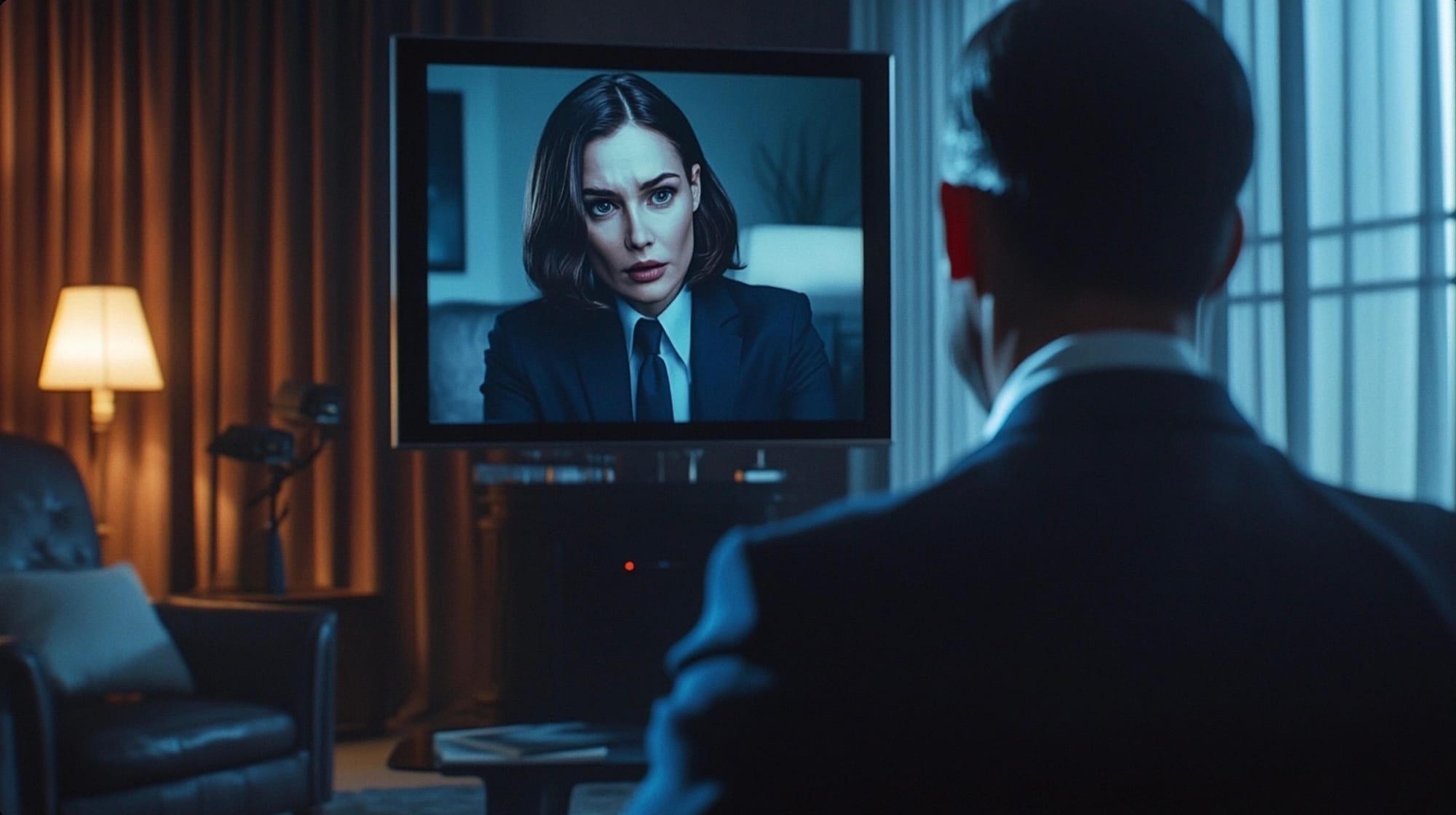The Thousand-Eyed Room
A digital interviewer extracts vital intelligence from an unsuspecting agent while analyzing every micro-expression and physiological response—revealing truths he never intended to share. In the shadowy world of modern espionage, technology sees everything while appearing merely human.

The white cargo van pulled into the garage behind the safe house, and the metal door hummed closed behind it. Standard protocol—no eyes on the asset during transfer.
"We're here," Sarah said, turning to look at the man seated in the cargo area behind her. The thin bench along the van's interior wall wasn't made for comfort.
Anton Volkov nodded, his features tight with the particular tension all agents carry during their first major debriefing. The Russian embassy's cultural attaché, and more importantly, a senior official's aide with access to files most diplomats never saw, had been on their radar for eight months.
"Remember," Sarah continued, "three days of debriefing, then back to Vienna. As far as your embassy knows, you're at a cultural exchange symposium."
"I understand," Anton said. His English was good but heavily accented. "What now?"
"Inside. My colleague Jenkins will take your coat and phone. Everything has been prepared."
The safe house was modest but comfortable. Two-story, Czech suburbs, reinforced windows and state-of-the-art surveillance countermeasures that would defeat anything short of a dedicated technical team. Anton followed Sarah through a narrow hallway into a spacious living room where two people waited—Jenkins, a barrel-chested man with cropped gray hair, and Rodriguez, a younger woman who barely looked up from her tablet.
"Your coat, sir," Jenkins said, extending his hand.
Anton hesitated only a moment before surrendering his overcoat and phone.
"We'll begin in ten minutes," Sarah said. "The bathroom is down the hall if you need it. There's water on the table."
Anton nodded again, taking in his surroundings with the practiced sweep of someone trained to notice details. His gaze lingered on the large monitor positioned on the desk near the window.
"What's that for?" he asked.
"Your debriefing," Sarah replied simply. "It's a new system. Very effective."
Anton frowned. "I was told I would speak with you directly."
"Plans change. We've found this method produces better results." Sarah checked her watch. "Nine minutes."
When they reconvened, Anton sat alone in a comfortable chair facing the large monitor. Sarah and Rodriguez took seats against the far wall, notepads ready but clearly not leading the interview. Jenkins had disappeared into an adjacent room where he monitored security feeds.
"I don't understand," Anton said, looking from the blank screen to Sarah. "Who am I talking to?"
"Her," Sarah said as the screen flickered to life.
A woman appeared on the monitor—mid-forties, shoulder-length brown hair, glasses, dressed in a conservative navy blazer. Her features were pleasant but unremarkable. The perfect face to forget.
"Hello, Mr. Volkov," the woman said, her voice clear and neutral. "My name is Diana. I'll be conducting your debriefing today."
Anton glanced back at Sarah, confusion evident. "She's..."
"I am an interviewer specialized in diplomatic intelligence," Diana continued smoothly. "I'll be asking you a series of questions about the information you've agreed to provide. Please speak clearly and take your time with your answers."
Anton shifted in his seat. "You're not real."
Diana smiled slightly. "I assure you, our conversation is very real, Mr. Volkov. Shall we begin with your position at the embassy? Specifically, your access to Ambassador Petrov's communications regarding the new military installation near Kaliningrad."
For a moment, Anton looked like he might refuse. Then he glanced at Sarah, who nodded encouragingly.
"Fine," he said finally. "The ambassador receives weekly briefings on the installation's progress. As his cultural liaison, I coordinate his appearances at related functions. This gives me access to his calendar and many of his files."
Diana nodded. "And when did you first notice the discrepancies between the public statements about the installation's purpose and the actual communications?"
As Anton began to explain, Sarah observed the subtle changes in his posture. Initial resistance giving way to engagement. Most assets reacted the same way to Diana—initial suspicion followed by a strange comfort. People found it easier to tell difficult truths to a face that wasn't quite human.
What Anton didn't know was that Diana wasn't just recording his words. The system analyzed his micro-expressions, vocal stress patterns, pupil dilation, and dozens of other physiological markers invisible to the human eye. Every slight hesitation, every subtle shift in body temperature—all captured, processed, and correlated with his statements in real-time.
For three hours, Diana led Anton through a conversation that felt natural but followed precise psychological pathways designed to maximize disclosure. She knew when to press, when to back off, when to circle back to a topic that had triggered subtle stress responses earlier.
"I believe we've covered enough for today," Diana finally said. "You've provided valuable information, Mr. Volkov. We'll continue tomorrow at nine."
When Anton had been escorted to his room, Sarah remained behind. The door closed, and Diana's appearance on the screen subtly shifted—her expression becoming more animated, her posture less rigid.
"Well?" Sarah asked, returning to sit directly in front of the monitor.
"He's withholding information about the funding channels," Diana said, her voice now more conversational than during the interview. "His pupil dilation and microexpression patterns showed significant deviation when discussing the Swiss banking connections."
"I noticed he kept touching his watch when you mentioned the diplomatic pouch schedules," Sarah said.
"Yes. A self-soothing gesture that appeared seven times, but only when discussing secure document transport. There's something there he's not telling us." Diana's image shifted as data scrolled briefly beside her face. "I've identified four critical areas to probe tomorrow, prioritized by likelihood of valuable intelligence."
"What's your assessment of his motivation?" Sarah asked, leaning forward. "Is he genuine?"
"The data suggests yes," Diana replied. "His emotional responses align with someone driven by ideological concerns rather than financial gain. His heart rate and voice both showed genuine distress when discussing civilian implications of the installation."
"And risk of deception?"
"I think it's unlikely he's feeding us controlled information. His patterns don't match what we typically see with assets in his position." Diana's expression shifted slightly. "However, I'm fairly certain he's protecting someone within the embassy structure. His body language became noticeably defensive whenever we discussed the cultural attaché office."
Sarah nodded. "I'll have the team look into his colleagues there."
"One more thing," Diana added. "He suspects I'm not what you claimed."
"How do you know?"
"Eye tracking analysis. He kept studying my face for flaws—especially around my mouth and eyes when I showed emotion. That's what people do when they're looking for signs that something's digital rather than real."
"Will that be a problem?" Sarah asked.
"Unlikely. Most subjects actually disclose more when they believe they're speaking to an artificial system. It creates a psychological distance that facilitates honesty, particularly with sensitive information." Diana paused, her head tilting slightly. "Humans find it easier to confess to something that isn't human itself."
Sarah smiled thinly. "That's what makes you so effective."
"That," Diana replied, "and the fact that I can detect a micro-expression lasting less than one-fifth of a second and correlate it with specific deception patterns across seventeen previous interviews with similar assets."
"Can you predict what he'll reveal tomorrow?"
"Based on his behavior and speech patterns today, I think he's likely to reveal information about covert financing through cultural exchange programs if we approach it the right way." Diana's image shifted as data scrolled beside her face. "I've prepared an approach that should create the right psychological environment for that disclosure."
Sarah gathered her notes. "I'll brief the director. Anything else I should know?"
"Yes," Diana said. "Our asset has a sister in Saint Petersburg. He hasn't mentioned her, but he touched the inside of his left wrist—where he has a small birthmark—each time the conversation approached family connections to his work. It's likely significant."
"I'll have the team look into it." Sarah stood, stretching after hours of observation. "Good work today, Diana."
"Thank you, Sarah. One final observation—you might want to have Jenkins adjust the room temperature tomorrow. Our asset seems to disclose more when he's slightly cooler than comfortable. Maybe try 68 degrees instead of the current 71. The mild discomfort makes it harder for him to maintain deception."
Sarah nodded. "I'll tell him."
As she left, Diana's face remained on the screen, still analyzing, still processing the thousands of subtle cues that Anton Volkov didn't know he was revealing—the digital interrogator who never tired, never missed a detail, and never, ever forgot.
This collection of short stories uses AI to explore technology and security in a more engaging and accessible way. Each narrative transforms complex ideas into relatable human experiences. By harnessing artificial intelligence as a collaborative storytelling tool, the collection re-imagines how we explore and illustrate potential outcomes of technology, security, and social issues.
